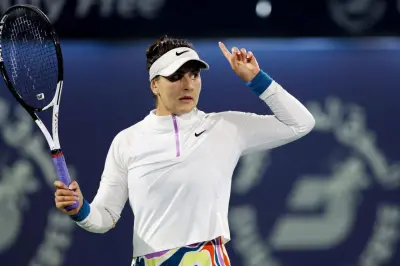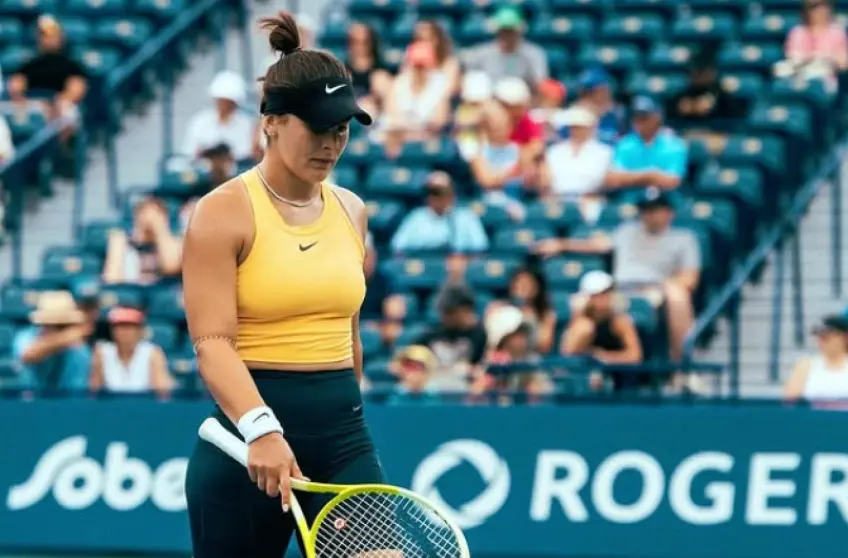When Bianca Andreescu stormed onto the professional tennis scene with her electric game, steely confidence, and signature swagger, she seemed unstoppable. By 2019, the Canadian teenager was holding the US Open trophy after defeating none other than Serena Williams. From the outside, it looked like a dream debut—a young star embraced by the tennis world with open arms.
But in a revealing recent reflection, Andreescu has shared that her first few years on the WTA Tour were far from welcoming. The reality, as she puts it, was “a little cold.”
Now, with years of experience, titles, and perspective behind her, Bianca Andreescu is speaking her truth about how lonely and emotionally taxing those early days were, peeling back the glittery surface of tennis stardom to reveal a tougher, more isolating journey.
The Ice Beneath the Spotlight
“I didn’t feel welcomed,” Andreescu admitted in a recent interview. “There were players who kept their distance. Not everyone, but enough to make you feel out of place.”
It’s a confession that hits hard in a sport that often markets itself as a global community. For Andreescu, breaking into that community wasn’t just about winning matches—it meant navigating locker room dynamics, social hierarchies, and a silent skepticism that trailed her rise.
Imagine being 18 years old, carrying the expectations of a nation, and walking into a room where legends are side-eyeing you, unsure if you’ve “earned” your place. That’s the emotional climate Andreescu faced—even as her game was setting the tennis world on fire.

Winning Didn’t Win Them Over
Bianca Andreescu wasn’t just another prospect. She arrived as a force of nature, clinching Indian Wells in 2019, going toe-to-toe with elite players, and showing maturity beyond her years. But success didn’t immediately earn her acceptance.
Instead, it seemed to stoke quiet resentment.
“I felt like some players didn’t take me seriously or thought I was cocky,” she recalled. “But I was just confident. I knew what I wanted.”
There’s a difference, of course, between confidence and arrogance. But in a sport with rigid traditions and hierarchies, young women who exude power and self-assuredness often pay a social tax.
Andreescu was no exception.
The Mental Toll: Loneliness in a Crowded Room
For many athletes, the Tour is not just physically demanding—it’s emotionally ruthless. Weeks away from home, high-stakes matches, and a relentless travel schedule can wear down even the most seasoned professionals.
Now imagine going through all of that, but also feeling iced out by your peers.
“Sometimes I’d be in the locker room and feel like I was invisible,” Andreescu said. “Or worse—like I was being judged.”
It’s a vulnerability that resonates deeply with anyone who has walked into a new space and felt they didn’t belong. For fans, it adds a new layer to Andreescu’s rise: she was winning titles while feeling utterly alone.
A Turning Point in Her Perspective
Over time, things began to shift. As her presence on the Tour became more permanent—and as her peers began to understand the person behind the results—the chill began to thaw.
“I’ve built some good relationships now,” she said with a smile. “There are people I talk to and travel with. It’s not all cold anymore.”
But Andreescu hasn’t forgotten how it started. That early freeze shaped how she now approaches newcomers.
“I go out of my way to welcome the younger players,” she said. “Because I know how it feels to be ignored.”
It’s a small act of kindness—but in the isolating world of pro tennis, that warmth can make all the difference.
Why Her Words Matter Now
Andreescu’s reflections come at a time when tennis is grappling with larger conversations about mental health, isolation, and emotional well-being.
From Naomi Osaka’s break from the sport to Iga Swiatek’s candid comments on mental strain, the WTA is slowly peeling away the mask of perfection. Bianca Andreescu’s honesty adds another dimension: even success doesn’t immunize you from feeling like an outsider.
Her voice matters not just because of her talent, but because of her willingness to speak when silence might be easier.
And fans are listening.

Social Reactions: “We Had No Idea…”
On social media, Andreescu’s revelations have struck a chord.
🎾 “This makes me love Bianca even more. She stayed true to herself in a cold world.”
🎾 “It’s so brave to speak about this. People think winning means everything is perfect.”
🎾 “The locker room politics are real. Respect to Bianca for surviving it.”
The outpouring of support shows that fans don’t just connect with champions—they connect with honesty. Bianca’s courage to open up is inspiring others to look beyond the trophies and into the heart of what it means to compete.
From Outsider to Leader
Today, Bianca Andreescu is no longer the wide-eyed teenager trying to find her place. She’s a seasoned competitor, a Grand Slam champion, and someone who younger players look up to.
And she’s using her platform to reshape the culture she once found uninviting.
“I want the Tour to be a space where people feel safe and seen,” she said. “Tennis is hard enough—we don’t need to make it harder for each other.”
It’s leadership born from experience. It’s empathy born from pain.
And it’s exactly what the sport needs right now.
A Call for Culture Change
Andreescu’s story is not just a personal memory—it’s a mirror reflecting a deeper issue in professional sports: the tension between competition and community.
Yes, every player is fighting for themselves. But must it be at the expense of basic kindness?
What Bianca Andreescu experienced is a reminder that talent alone doesn’t always guarantee inclusion—especially for women who dare to arrive unapologetically ambitious.
She survived the cold. Now, she’s making space for warmth.

Final Thoughts: A New Chapter for Bianca—and the WTA?
As Bianca Andreescu continues her comeback from injury setbacks and mental health breaks, there’s a noticeable change in her. She seems lighter, more centered, more open.
That may be because she’s not just chasing trophies anymore—she’s reclaiming her space in a world that once made her feel small.
Her story matters not just because it’s hers, but because it echoes the experiences of so many who step into new environments and wonder, Will they accept me?
Bianca Andreescu’s answer: They didn’t at first. But I didn’t shrink. And now, I’m paving a warmer path for the next one in line.


